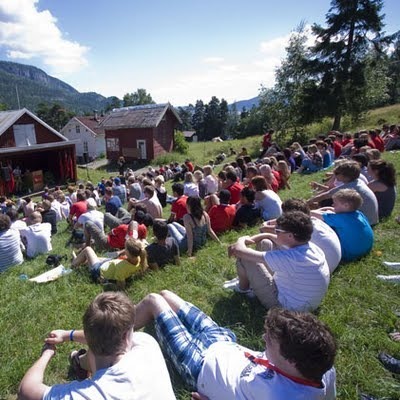Ken MacLeod's Blog, page 21
August 20, 2011
A Treatise of Humean Nature
When the hero of Alastair Gray's Lanark was a typically tormented teenager, he happened to open a book. The book began:
Read the rest here.
All the perceptions of the human mind resolve themselves into two distinct kinds, which I shall call IMPRESSIONS and IDEAS.As he read on, he found that the text soothed his mind by lifting him right out of his problems, and giving him something else to think about. This is one way that philosophy can be applied to everyday life. Another, of course, is by mining the great philosophers for nuggets of practical wisdom. Not many of us have time to do that, or have any idea where to begin prospecting, but thanks to the division of labour (you'll find that in Adam Smith) someone else can do the mining for us, and package the result in a book you can read on the bus.
Read the rest here.
Published on August 20, 2011 14:30
August 19, 2011
A Close Reading at the Book Festival
I have a new post up at Genotype, on taking part in a close reading and dicussion of two poems by Sorley MacLean. I recommend the experience.
Published on August 19, 2011 15:41
August 17, 2011
Cory Doctorow interviewed at Edinburgh Book Festival
On Sunday I interviewed Cory Doctorow, and the video (in two parts - I'm still learning) is now online at Genotype.
Published on August 17, 2011 19:34
August 16, 2011
Alan Warner, heard over echoes
My first post from the Book Festival is now up at Genotype: an account of a reading and discussion by Alan Warner of his forthcoming book, The Dead Man's Pedal.
I've just started reading his first book, Morvern Callar, after years of enthusiastic recommendations by informed friends. I wish I'd taken their advice earlier - the book is amazing.
I've just started reading his first book, Morvern Callar, after years of enthusiastic recommendations by informed friends. I wish I'd taken their advice earlier - the book is amazing.
Published on August 16, 2011 15:25
August 15, 2011
The Revolution Will be Followed by a Signing Session in the Adjacent Tent: Blogging the Book Festival

This year's theme for the Edinburgh International Book Festival was decided last year. With what was described at the launch party as uncanny prescience, the theme was 'revolution'. For the sixth year running, the Genomics Forum is a sponsor, and this year it's supporting three very topical debates. Along with Pippa Goldschmidt and the Forum's new Resident Playwright, Peter Arnott, I'll be blogging from the festival at Genotype, the blog of the Genomics Forum (cross-posted to the Festival's own blog). I'll post links to these here as they come in.
Former Guardian Edinburgh BeatBlogger Michael MacLeod (sometimes referred to in the distant past of this blog as 'Young Master Early') is blogging the book festival on a more professional basis for the Guardian.
Published on August 15, 2011 09:37
August 10, 2011
When I were a lad, this were all fields
Over the past few days I've had a worse sense of insecurity and instability than I had after 9/11, and far more unsettling than I anything I felt when I was actually, ah, present at scenes of considerably more consequent rucks, not to mention rocks. Seeing Lewisham's clock tower on the telly had me thinking along the lines that when I was that age we knew what we were fighting for. There's probably a blue plaque there in our memory.
On Monday evening I watched The Grand Experiment, a documentary in a series on Great Thinkers: In Their Own Words - their words to, and on, the BBC: which institution, we are reminded, was a grand experiment in itself. I spent the rest of the evening and too much of the small hours watching BBC News 24 on the riots, the night Croydon burned.
The Grand Experiment was, of course, the postwar Keynes-Beveridge full-employment welfare state. Supported by the main parties of left and right, by the end of the sixties it was coming under attack from both flanks: you can see Tariq Ali calling for the abolition of money and the power of the soviets, and Milton Friedman calling for the ascendance of monetarism and the freedom of the markets, and in the middle some floundering mouthpiece of the consensus, such as poor old Lord Balogh marching into the lions' den of Chicago to defend the Labour Government.
It seems obvious now that the postwar settlement had reached its limits by 1979. But I sometimes wonder if a more rational left than I was part of could have carried it forward, rather than helped to bring it down.
I blame the parents, and the parents were us.

On Monday evening I watched The Grand Experiment, a documentary in a series on Great Thinkers: In Their Own Words - their words to, and on, the BBC: which institution, we are reminded, was a grand experiment in itself. I spent the rest of the evening and too much of the small hours watching BBC News 24 on the riots, the night Croydon burned.
The Grand Experiment was, of course, the postwar Keynes-Beveridge full-employment welfare state. Supported by the main parties of left and right, by the end of the sixties it was coming under attack from both flanks: you can see Tariq Ali calling for the abolition of money and the power of the soviets, and Milton Friedman calling for the ascendance of monetarism and the freedom of the markets, and in the middle some floundering mouthpiece of the consensus, such as poor old Lord Balogh marching into the lions' den of Chicago to defend the Labour Government.
It seems obvious now that the postwar settlement had reached its limits by 1979. But I sometimes wonder if a more rational left than I was part of could have carried it forward, rather than helped to bring it down.
I blame the parents, and the parents were us.
Published on August 10, 2011 19:10
August 1, 2011
Seeing like a state
A political definition for the ages:
Anarchism is a political philosophy which considers the state undesirable, unnecessary, and harmful, and instead promotes a stateless society, or anarchy.I hope someone's already designing the T-shirt.
Any information relating to anarchists should be reported to your local police.
Published on August 01, 2011 15:09
July 30, 2011
Lighter notes
I've written a piece (to be published in SFX issue 214) on Nineteen Eighty-Four for the SFX Book Club, and discussion of the book itself is now open.
My short story 'The Surface of Last Scattering' has been just been accepted for the September special SF issue of Technology Review. And from what editor Stephen Cass tells me, it's going to be one very special issue, and well worth looking out for.
My short story 'The Surface of Last Scattering' has been just been accepted for the September special SF issue of Technology Review. And from what editor Stephen Cass tells me, it's going to be one very special issue, and well worth looking out for.
Published on July 30, 2011 16:04
July 25, 2011
Hope not Hate
 This photo is from the Norwegian AUF (Labour Youth League)'s page about the Utøya summer camp, which makes very painful reading today.
This photo is from the Norwegian AUF (Labour Youth League)'s page about the Utøya summer camp, which makes very painful reading today.You can sign an online book of condolence and solidarity here. Please do.
Published on July 25, 2011 15:27
July 24, 2011
Gates of Oslo

Fascism is defined by its function, not its ideology. Its function is to attack and, in a severe enough crisis, to destroy the organised labour movement. Its ideology depends on time and place. Many ideas we traditionally associate with fascism have lost traction. The Third Reich and the Corporate State have as drawbacks their detractors, their admitted downsides, and above all their defeat. Nobody worth recruiting gives a toss about the Jewish conspiracy - except Islamists, and you don't want to go there, though some have tried. Ranting about Black people might get you a hearing in parts of the US, but the idea doesn't really travel. And yet, there's a niche for fascism, waiting for fresh ideas to fill it.
The Blind Watchmaker of the memes looks down, blindly, and tinkers ...
The confessed perpetrator of the Norway massacre has given us the thinking behind it. (Via.) Gramsci, 'Cultural Marxism', the Frankfurt School, feminism and political correctness as the root of the problem, the EU apparat as its enforcer, Muslim immigration and Islamist terrorism as its consequence or indeed as its weapon ... now we're getting somewhere.
An ideology for justifying violence against racial minorities, the Left and the labour movement has been developing in plain sight, rather than in the underworld of NSDAP re-enactors. It has now led to a massacre of the children of the one of the most moderate labour movements in the world.
Two things have to come out of this: first, the mainstream left and labour movements have to take seriously security and self-defence; second, the mainstream right must be made to pay a heavy political price for this atrocity.
As Gramsci wrote 90 years ago, in a world now lost: War is War.
Published on July 24, 2011 11:32
Ken MacLeod's Blog
- Ken MacLeod's profile
- 762 followers
Ken MacLeod isn't a Goodreads Author
(yet),
but they
do have a blog,
so here are some recent posts imported from
their feed.



